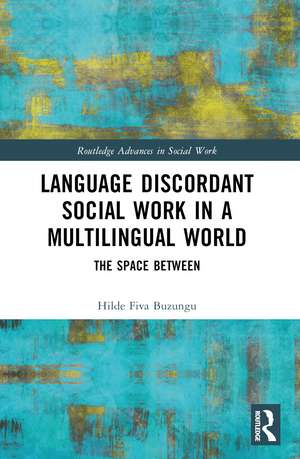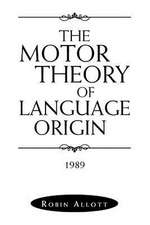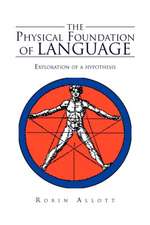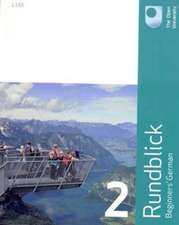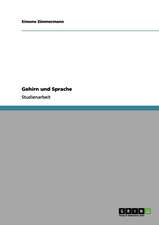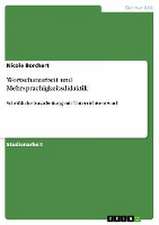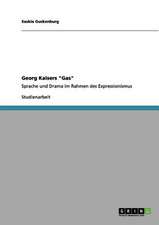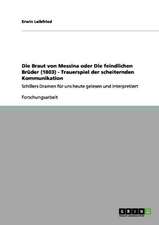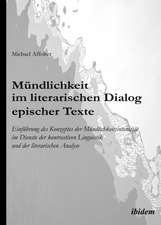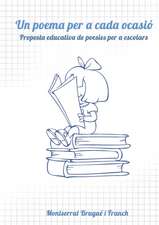Language Discordant Social Work in a Multilingual World: The Space Between: Routledge Advances in Social Work
Autor Hilde Fiva Buzunguen Limba Engleză Paperback – 8 oct 2024
Exploring how street-level bureaucrats navigate the landscape of these discretionary assessments of language discordance, language proficiency, and the need for interpreting, the book focuses on four main themes:
- the complexity of social work talk
- the issue of participation in language discordant meetings
- communicative interaction
- the issue of how clarification is requested when needed, and whether professionals and service users are able to reach clarity when something is unclear
It will be of interest to all social work students, academics and professionals as well as those working in public services and allied health more broadly.
| Toate formatele și edițiile | Preț | Express |
|---|---|---|
| Paperback (1) | 382.16 lei 6-8 săpt. | |
| Taylor & Francis – 8 oct 2024 | 382.16 lei 6-8 săpt. | |
| Hardback (1) | 889.17 lei 6-8 săpt. | |
| Taylor & Francis – 21 apr 2023 | 889.17 lei 6-8 săpt. |
Din seria Routledge Advances in Social Work
- 5%
 Preț: 286.86 lei
Preț: 286.86 lei - 5%
 Preț: 289.85 lei
Preț: 289.85 lei -
 Preț: 326.49 lei
Preț: 326.49 lei -
 Preț: 301.64 lei
Preț: 301.64 lei - 5%
 Preț: 1012.32 lei
Preț: 1012.32 lei -
 Preț: 309.55 lei
Preț: 309.55 lei -
 Preț: 303.60 lei
Preț: 303.60 lei -
 Preț: 282.41 lei
Preț: 282.41 lei -
 Preț: 304.68 lei
Preț: 304.68 lei -
 Preț: 301.58 lei
Preț: 301.58 lei -
 Preț: 309.99 lei
Preț: 309.99 lei -
 Preț: 284.10 lei
Preț: 284.10 lei - 5%
 Preț: 221.74 lei
Preț: 221.74 lei - 9%
 Preț: 867.57 lei
Preț: 867.57 lei -
 Preț: 405.52 lei
Preț: 405.52 lei - 5%
 Preț: 332.06 lei
Preț: 332.06 lei -
 Preț: 383.24 lei
Preț: 383.24 lei -
 Preț: 402.66 lei
Preț: 402.66 lei - 12%
 Preț: 331.87 lei
Preț: 331.87 lei - 18%
 Preț: 1002.99 lei
Preț: 1002.99 lei -
 Preț: 375.18 lei
Preț: 375.18 lei -
 Preț: 411.82 lei
Preț: 411.82 lei -
 Preț: 399.79 lei
Preț: 399.79 lei -
 Preț: 376.10 lei
Preț: 376.10 lei -
 Preț: 404.58 lei
Preț: 404.58 lei - 28%
 Preț: 820.32 lei
Preț: 820.32 lei - 18%
 Preț: 1000.27 lei
Preț: 1000.27 lei - 18%
 Preț: 1110.77 lei
Preț: 1110.77 lei - 5%
 Preț: 412.72 lei
Preț: 412.72 lei - 18%
 Preț: 999.51 lei
Preț: 999.51 lei - 17%
 Preț: 251.58 lei
Preț: 251.58 lei -
 Preț: 376.10 lei
Preț: 376.10 lei -
 Preț: 443.11 lei
Preț: 443.11 lei -
 Preț: 495.67 lei
Preț: 495.67 lei - 18%
 Preț: 1000.27 lei
Preț: 1000.27 lei -
 Preț: 476.64 lei
Preț: 476.64 lei -
 Preț: 389.38 lei
Preț: 389.38 lei -
 Preț: 376.10 lei
Preț: 376.10 lei
Preț: 382.16 lei
Nou
Puncte Express: 573
Preț estimativ în valută:
73.13€ • 76.54$ • 60.86£
73.13€ • 76.54$ • 60.86£
Carte tipărită la comandă
Livrare economică 31 martie-14 aprilie
Preluare comenzi: 021 569.72.76
Specificații
ISBN-13: 9781032394633
ISBN-10: 1032394633
Pagini: 150
Dimensiuni: 156 x 234 mm
Greutate: 0.28 kg
Ediția:1
Editura: Taylor & Francis
Colecția Routledge
Seria Routledge Advances in Social Work
Locul publicării:Oxford, United Kingdom
ISBN-10: 1032394633
Pagini: 150
Dimensiuni: 156 x 234 mm
Greutate: 0.28 kg
Ediția:1
Editura: Taylor & Francis
Colecția Routledge
Seria Routledge Advances in Social Work
Locul publicării:Oxford, United Kingdom
Public țintă
Academic and PostgraduateCuprins
1.Introduction: Social work in a multilingual world. 2.Language discordant social work communication. 3.Complexity of talk in social work meetings. 4.Participation in social work meetings. 5.Communicative interaction in social work meetings. 6.Requesting clarification and reaching clarity. 7.Social work and human dignity in the context of language discordance.
Notă biografică
Hilde Fiva Buzungu is Associate Professor at the department of social work, child welfare and social policy at Oslo Metropolitan University in Norway. Her research focuses on communicative interaction between professional practitioners and linguistic minorities, with particular attention given to issues of power and domination, communicative oppression and linguicist structures in society.
Recenzii
A fascinating study of an understudied field, this book demonstrates the profound relevance of language and communication studies in research and practice in linguistically diverse contexts. As Hilde Fiva Buzungu shows, it is not just researchers of cultural complexity who tend to underestimate the effects of linguistic barriers and misunderstandings, but this blind spot is also widespread in policy and practice. Many, both academics and practitioners, would benefit from reading this highly original and lucid book.Thomas Hylland Eriksen
Professor of Social Anthropology
University of Oslo
Cross-cultural social work, including international social work, is grounded in communication between people from different language and cultural backgrounds. In such interactions it is vital that ways are found to overcome the barriers that such differences create. In such contexts, therefore, interpretation is the key to effective work. Yet, the role of interpreters and how to work effectively with them is not widely understood by social workers. Hilde Fiva Buzungu’s careful, critical study opens up insights that will enable social workers not only to consider how to work through interpretation more effectively, but also how to understand and address the many problems that communication through a third person can create. This study will be essential material not only for social workers in service provision roles, but also for managers and policy makers, educators and researchers alike.
Richard Hugman, PhD FACSW
Emeritus Professor of Social Work
University of New South Wales
The power imbued in communicative talk within any given language is complex. In Language Discordant Social Work in a Multilingual World, Hilde Buzungu boldly addresses the accentuation of these complexities in talk across languages. Through powerful descriptions of micro-level interactions between social workers and service users, Buzungu discusses how language discordance influences constructions and representations of the Other, the tendency towards essentializing discourses, the culturalization of social concerns, and the silencing of minority voices. In a neoliberal world characterized by decreased funding, including funding cuts for language translation for asylum seekers, refugees and migrants, where social workers struggle against organizational constraints, Buzungu’s findings on the impacts of skilled versus untrained translators have policy implications and implications for social work’s ethical commitments. A source that can be used in advocacy initiatives!
Vishanthie Sewpaul, PhD
Emeritus Prof, UKZN South Africa
Professor of Social Anthropology
University of Oslo
Cross-cultural social work, including international social work, is grounded in communication between people from different language and cultural backgrounds. In such interactions it is vital that ways are found to overcome the barriers that such differences create. In such contexts, therefore, interpretation is the key to effective work. Yet, the role of interpreters and how to work effectively with them is not widely understood by social workers. Hilde Fiva Buzungu’s careful, critical study opens up insights that will enable social workers not only to consider how to work through interpretation more effectively, but also how to understand and address the many problems that communication through a third person can create. This study will be essential material not only for social workers in service provision roles, but also for managers and policy makers, educators and researchers alike.
Richard Hugman, PhD FACSW
Emeritus Professor of Social Work
University of New South Wales
The power imbued in communicative talk within any given language is complex. In Language Discordant Social Work in a Multilingual World, Hilde Buzungu boldly addresses the accentuation of these complexities in talk across languages. Through powerful descriptions of micro-level interactions between social workers and service users, Buzungu discusses how language discordance influences constructions and representations of the Other, the tendency towards essentializing discourses, the culturalization of social concerns, and the silencing of minority voices. In a neoliberal world characterized by decreased funding, including funding cuts for language translation for asylum seekers, refugees and migrants, where social workers struggle against organizational constraints, Buzungu’s findings on the impacts of skilled versus untrained translators have policy implications and implications for social work’s ethical commitments. A source that can be used in advocacy initiatives!
Vishanthie Sewpaul, PhD
Emeritus Prof, UKZN South Africa
Descriere
Based on ethnographic observations of encounters between social workers and people with whom they do not have a shared language, this book analyses the impact of language discordance on the quality of professional service provision.
